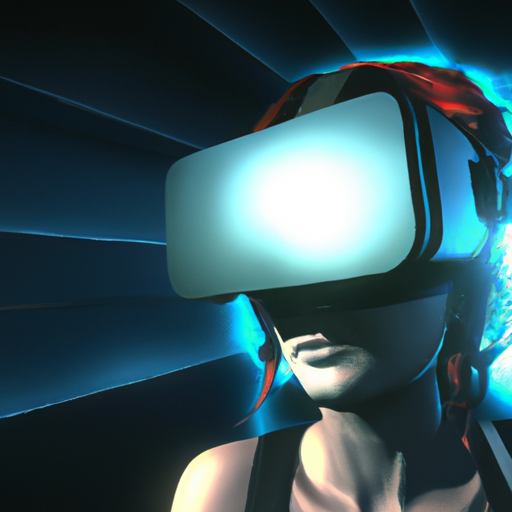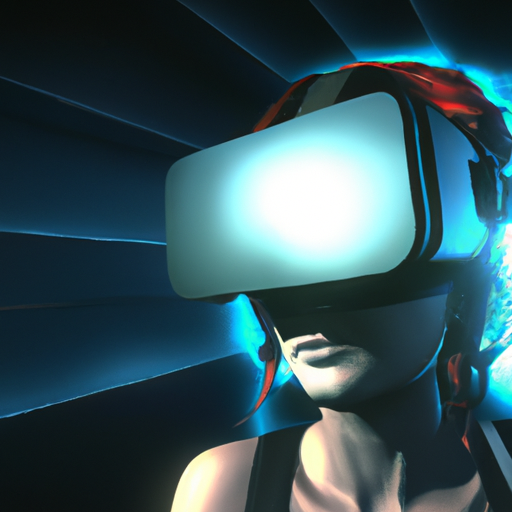How Does Virtual Reality Impact Gaming? 7 Exciting Possibilities
Imagine a world where you can step into the shoes of your favorite video game character, where you can swing a virtual sword or shoot a virtual gun with your own hands. Virtual reality (VR) technology has taken the gaming industry by storm, revolutionizing the way we play and experience games. With the ability to immerse yourself fully in a digital world, VR has transformed gaming into a more interactive, lifelike, and captivating experience. In this article, we will explore the question, “How does virtual reality impact gaming?” and how it has opened up new possibilities for gamers everywhere.
How Does Virtual Reality Impact Gaming: Enhanced Immersion
Virtual reality (VR) technology has revolutionized the gaming industry by providing enhanced immersion for players. With VR, you can now step into realistic environments and experience a heightened sense of presence like never before. Whether you’re exploring ancient ruins, battling aliens on distant planets, or simply walking through a bustling city, VR allows you to truly feel like you are there. The combination of visual and audio cues in VR creates a rich and immersive experience that transports you to another world, making your gaming sessions more exciting and engaging.
Realistic Environments
One of the most exciting aspects of VR gaming is the ability to explore and interact with incredibly realistic environments. Through the use of advanced graphics and sound design, VR games can recreate detailed and lifelike worlds that draw you in and make you feel like you’re really there. From the smallest details like individual leaves rustling in the wind to grand vistas stretching out before you, VR allows for a level of immersion that traditional gaming simply cannot match. Whether you’re exploring the depths of the ocean, navigating a post-apocalyptic wasteland, or wandering through a fantastical realm, VR brings these environments to life in a way that is truly awe-inspiring.
Sense of Presence
In addition to realistic environments, VR gaming also provides a heightened sense of presence. When you put on a VR headset, you are transported into the virtual world, and your brain perceives it as if it were real. This sense of presence allows you to feel like you are truly part of the game, with the virtual world becoming an extension of your own reality. Whether you’re crouching behind cover, dodging enemy attacks, or reaching out to interact with objects, the sense of presence in VR gaming adds a whole new level of excitement and intensity to your gaming experiences.
Physical Interaction
Another aspect of enhanced immersion in VR gaming is the ability for physical interaction within the virtual world. With VR controllers and motion tracking technology, you can use your hands and body to interact with objects and manipulate the environment. This adds a new layer of realism and engagement to the gaming experience, as you can physically reach out and grab objects, shoot weapons, or perform actions as if you were actually there. The physicality of VR gaming not only makes it more immersive but also provides opportunities for innovative gameplay mechanics and unique experiences that are not possible in traditional gaming.
How Does Virtual Reality Impact Gaming: Improved Game Mechanics
VR technology has not only enhanced immersion but also improved game mechanics, introducing new ways of control and better movement systems. These advancements have opened up a world of innovative gameplay features that take gaming to a whole new level.
New Ways of Control
In traditional gaming, players rely on keyboards, controllers, or mouse inputs to control their characters. However, VR gaming introduces new ways of control, such as motion controllers or haptic gloves, which allow for more intuitive and natural interactions within the virtual world. Instead of pressing buttons or moving a joystick, you can now physically reach out and interact with objects, using your hands and body movements to control the game. This hands-on approach to control adds a new level of immersion and allows for more complex and realistic interactions in gameplay.
Better Movement Systems
One of the challenges of VR gaming has been finding suitable movement systems that don’t induce motion sickness or limit gameplay. Traditional movement methods like joystick-based navigation can lead to discomfort and disorientation in VR. However, game developers have been experimenting with innovative movement systems that make VR gaming more comfortable and immersive. From teleportation-based movement where players can instantly teleport to different locations within the virtual world, to full-body movement solutions that track your physical movements and translate them into in-game actions, these advancements in movement systems make VR gaming more accessible and enjoyable for a wider range of players.
Innovative Gameplay Features
The improved game mechanics in VR gaming have also paved the way for innovative gameplay features that are unique to the VR experience. From puzzle-solving and exploration games that require physical interaction with objects, to multiplayer VR games that rely on teamwork and coordination, VR offers a whole new range of gameplay possibilities. The immersive nature of VR allows for more immersive storytelling, where players can experience the game world from a first-person perspective and become fully immersed in the narrative. Additionally, VR can introduce new gameplay mechanics like using your own body movements to perform in-game actions, adding an extra layer of physicality and challenge to the gaming experience.

How Does Virtual Reality Impact Gaming: Expanded Gaming Experiences
Virtual reality not only enhances immersion and improves gameplay mechanics but also expands gaming experiences beyond what was previously possible. VR opens up new opportunities for virtual travel and exploration, simulation of dangerous activities, as well as educational and training opportunities.
Virtual Travel and Exploration
One of the most exciting aspects of VR gaming is the ability to virtually travel and explore places that may be inaccessible or too expensive to visit in real life. VR allows you to step into the shoes of an adventurer, an archaeologist, or a space explorer, and experience the thrill of exploring new worlds and unknown territories. Whether you’re exploring ancient ruins, climbing mountains, or flying through space, VR transports you to these locations and provides a sense of wonder and discovery that is unparalleled. Virtual travel and exploration in VR gaming not only satisfy our curiosity for the unknown but also provide opportunities for cultural enrichment and educational experiences.
Simulation of Dangerous Activities
Another unique aspect of VR gaming is the ability to simulate dangerous activities in a safe and controlled environment. Whether it’s skydiving, deep-sea diving, or extreme sports, VR allows you to experience the adrenaline rush and excitement of these activities without the associated risks. By providing a realistic and immersive simulation, VR gaming can help overcome physical limitations or fears and provide a sense of accomplishment and mastery. Additionally, VR simulations can be used as training tools for professionals in high-risk fields, such as military personnel, firefighters, or surgeons, allowing them to practice and refine their skills in a safe and controlled environment.
Educational and Training Opportunities
VR gaming also presents new opportunities for educational and training purposes. By combining the immersive nature of VR with interactive gameplay, educational and training experiences can be transformed into engaging and effective learning tools. For example, VR can be used to simulate historical events, allowing students to step back in time and experience history firsthand. In the field of medicine, VR can be used for surgical training or patient simulations, providing students and practitioners with a realistic and immersive learning environment. The use of VR in education and training not only enhances the learning experience but also improves retention and proficiency in various fields.
How Does Virtual Reality Impact Gaming: Social Interaction
In addition to enhancing immersion and expanding gaming experiences, VR gaming also enables social interaction, bringing players together in virtual worlds. Whether it’s through multiplayer VR games, virtual hangouts, or improved communication tools, VR fosters social connections and provides opportunities for shared experiences.
Multiplayer VR Games
Multiplayer VR games allow players to interact with each other in the virtual world, collaborating or competing in various gameplay scenarios. This social aspect of VR gaming brings people together, allowing them to form new friendships, strengthen existing relationships, and build communities within the gaming world. Whether you’re teaming up with friends to defeat enemies or battling against other players in competitive matches, multiplayer VR games provide a social experience that goes beyond traditional gaming. The ability to see and interact with other players in real-time adds a sense of presence and camaraderie, making the shared gaming experience more immersive and enjoyable.
Virtual Hangouts and Events
In addition to multiplayer games, VR also offers virtual hangouts and events where players can gather and socialize in virtual spaces. Whether it’s attending a virtual concert, participating in virtual meetups, or simply hanging out with friends in a virtual environment, these virtual social spaces provide a sense of presence and connection that transcends physical boundaries. VR allows you to meet and interact with people from all over the world, fostering a sense of community and belonging in the gaming world. Through these virtual hangouts and events, VR gaming provides a unique platform for social interactions and shared experiences, creating lasting memories and friendships.
Improved Communication
VR gaming also improves communication between players, allowing for more natural and immersive interactions. Instead of using voice chat or text messages, VR enables players to use gestures, facial expressions, and body language to communicate with each other within the virtual world. This adds a new level of expressiveness and nuance to communication, making interactions more immersive and lifelike. Whether you’re giving a thumbs-up to show approval, waving to say hello, or nodding your head to indicate agreement, VR communication enhances the sense of presence and social connection in gaming.

How Does Virtual Reality Impact Gaming: Health Benefits
Apart from the immersive experiences and social interactions, VR gaming also offers several health benefits. From physical exercise to pain relief and therapy, as well as cognitive stimulation, VR has the potential to positively impact our well-being.
Physical Exercise
One of the most obvious health benefits of VR gaming is the opportunity for physical exercise. Many VR games require players to move their bodies, whether it’s dodging obstacles, swinging weapons, or performing full-body movements. This physical activity can help improve cardiovascular health, increase muscle strength and flexibility, and promote weight loss. VR fitness games have gained popularity for their ability to make exercise fun and engaging, turning workouts into immersive gaming experiences. By incorporating physical exercise into gaming, VR can help combat sedentary lifestyles and encourage a more active and healthy lifestyle.
Pain Relief and Therapy
VR gaming has also been found to provide pain relief and therapeutic benefits. Virtual reality can be used as a distraction technique for managing acute and chronic pain, allowing patients to focus their attention on the virtual world rather than their physical discomfort. Additionally, VR can be used in therapy settings to treat phobias, anxiety, and post-traumatic stress disorder (PTSD). Through exposure therapy, where patients are gradually exposed to their fears or triggers in a controlled virtual environment, VR can help desensitize individuals and reduce their anxiety or trauma-related symptoms. The immersive and interactive nature of VR gaming makes it a powerful tool for pain management and therapeutic interventions.
Cognitive Stimulation
VR gaming also offers cognitive stimulation, which is particularly beneficial for older adults or individuals with cognitive impairments. Studies have shown that engaging in VR activities can improve cognitive functions such as memory, attention, and problem-solving skills. VR games that require mental engagement, such as puzzle-solving or strategy games, can help keep the mind sharp and improve cognitive abilities. Additionally, VR has been used as a tool for cognitive rehabilitation, where individuals with brain injuries or neurological conditions can undergo targeted cognitive training in a simulated and controlled environment. The cognitive stimulation provided by VR gaming has the potential to enhance brain health and improve overall cognitive functioning.
How Does Virtual Reality Impact Gaming: Challenges and Limitations
While VR gaming has numerous benefits, there are also some challenges and limitations that need to be considered.
Technical Requirements
One of the main challenges of VR gaming is the technical requirements. To fully experience VR, you need a powerful gaming computer or console, a high-quality VR headset, and motion controllers. These hardware requirements can be costly and may not be affordable for everyone. Additionally, setting up and calibrating the VR equipment can be time-consuming and may require some technical expertise. The technical requirements of VR gaming can be a barrier for some players, limiting access to this immersive gaming experience.
High Costs
Another limitation of VR gaming is the high costs associated with the technology. Not only do you need to invest in expensive VR equipment, but VR games themselves can also be more expensive than traditional games. The development costs for VR games are often higher due to the need for more immersive graphics, sound design, and gameplay mechanics. This can result in higher prices for consumers, making VR gaming less accessible for those on a limited budget. Additionally, the cost of maintaining and upgrading VR equipment can be an ongoing expense for players, further adding to the overall cost of VR gaming.
Discomfort and Motion Sickness
Some players may experience discomfort or motion sickness when playing VR games. This is often caused by the discrepancy between the movements perceived in the virtual world and the lack of corresponding movements in the physical world. The disconnect between visual cues and physical sensations can lead to feelings of nausea, dizziness, and discomfort. While VR developers have been working on minimizing these issues through advancements in movement systems and player comfort settings, motion sickness remains a potential limitation of VR gaming. It is important for players to take breaks, acclimate gradually, and adjust settings to minimize any discomfort or motion sickness.

Impact on the Gaming Industry
The introduction of VR gaming has had a significant impact on the gaming industry as a whole. From increased demand and revenue to new market opportunities and heightened competition, VR has brought about notable changes in the gaming landscape.
Increased Demand and Revenue
VR gaming has generated a surge in demand from both gamers and developers. The immersive and captivating nature of VR experiences has drawn in gamers of all ages and interests, leading to an increase in the number of VR game sales and hardware purchases. This growing demand for VR gaming has resulted in greater revenue for game developers and hardware manufacturers, driving innovation and investment in the industry. As more players recognize the unique experiences offered by VR gaming, the demand and revenue generated by the sector are expected to continue to rise.
New Market Opportunities
The rise of VR gaming has created new market opportunities for developers, manufacturers, and content creators. With the growing popularity of VR, there is a demand for diverse and innovative VR games and experiences. This has opened up avenues for independent developers and small studios to enter the gaming industry and introduce their own unique VR creations. Additionally, the market for VR hardware and accessories has expanded, with companies developing specialized VR controllers, haptic feedback devices, and other peripherals to enhance the VR gaming experience. The emergence of VR gaming has led to a thriving market with new players and opportunities, driving growth and creativity in the industry.
Innovation and Competition
The introduction of VR gaming has spurred innovation and heightened competition within the gaming industry. Developers are constantly pushing the boundaries of what is possible in VR, exploring new concepts, and experimenting with innovative gameplay mechanics. This focus on innovation has led to the creation of groundbreaking VR games and experiences that continue to push the limits of the technology. Additionally, the increased competition in the VR gaming market has resulted in higher quality games, improved hardware, and more affordable prices for consumers. As VR gaming continues to evolve, the industry as a whole will benefit from the advancements and creative ideas that arise from this competitive environment.
Future Potential of VR Gaming
The future potential of VR gaming is promising, with advancements in technology, integration with other technologies, and the rise of virtual reality arcades.
Advancements in Technology
As technology continues to progress, the potential for VR gaming will expand even further. Advancements in graphics, sound design, and motion tracking will result in even more realistic and immersive experiences. The development of wireless VR headsets will enhance mobility and eliminate the need for cables, making VR gaming more accessible and convenient. Additionally, improvements in haptic feedback and tactile sensations will add another layer of immersion, making VR gaming a truly multisensory experience. The future of VR gaming is likely to feature advancements that we can hardly imagine today, providing even more engaging and breathtaking experiences for players.
Integration with Other Technologies
Virtual reality has the potential to integrate with other emerging technologies to create even more exciting gaming experiences. The combination of VR with augmented reality (AR) can create mixed reality experiences where virtual objects are seamlessly blended with the real world. This opens up possibilities for innovative gameplay mechanics and interactive narratives that merge the physical and virtual worlds. Additionally, advancements in AI and machine learning can result in more intelligent and responsive virtual characters and environments, enhancing the realism and immersion of VR gaming. As these technologies continue to evolve and converge, the potential for immersive and interactive gaming experiences becomes even greater.
Virtual Reality Arcades
Virtual reality arcades have started to emerge as a popular trend, offering players the opportunity to experience VR gaming in dedicated venues. These arcades provide access to high-end VR equipment and a wide range of VR games and experiences that may not be readily available to the average consumer. Virtual reality arcades offer a social and communal gaming experience, where players can gather with friends or meet new people who share a passion for VR gaming. The rise of virtual reality arcades demonstrates the potential for VR to become a mainstream entertainment option, reaching a wider audience and showcasing the power of immersive gaming experiences.

How Does Virtual Reality Impact Gaming: Ethical Considerations
While VR gaming offers numerous benefits, it also raises ethical considerations that need to be addressed.
Effects on Mental Health
One concern regarding VR gaming is its potential impact on mental health. Immersive and realistic experiences can blur the lines between virtual and real life, leading to potential psychological and emotional effects. Excessive exposure to violent or disturbing content in VR games may contribute to desensitization or increased aggressive behavior. Additionally, the immersive nature of VR may exacerbate symptoms for individuals with certain mental health conditions, such as anxiety or phobias. It is crucial to ensure that ethical guidelines and responsible gaming practices are in place to protect the mental well-being of players and provide support when needed.
Privacy Concerns
VR gaming involves collecting and processing large amounts of personal data, including biometric information, user preferences, and behavioral patterns. This raises privacy concerns regarding the protection of sensitive personal information and potential misuse of data. It is essential for VR developers and manufacturers to prioritize data security and implement robust privacy measures to protect the privacy and confidentiality of users. Additionally, clear and transparent user consent and control over data sharing should be provided, allowing individuals to make informed decisions about their personal information.
Virtual Violence and Morality
As VR technology becomes more advanced, the realism and immersion of violent and morally questionable scenarios in VR games raise ethical questions. While violent content has long been a part of traditional gaming, the heightened immersion of VR can intensify the psychological impact of these experiences. There is a need for responsible content creation and ethical guidelines to ensure that the potential harm caused by violent or morally questionable content is minimized. Additionally, fostering a culture of empathy and ethical behavior within the VR gaming community is crucial, promoting positive and responsible use of VR technology.
How Does Virtual Reality Impact Gaming: Conclusion
Virtual reality has made a significant impact on the gaming industry, providing enhanced immersion, improved game mechanics, expanded gaming experiences, social interaction, health benefits, and new market opportunities. The realistic environments, sense of presence, and physical interaction offered by VR have transformed gaming into a truly immersive and engaging experience.
VR gaming opens up new possibilities for exploring different worlds, experiencing dangerous activities within a safe environment, and providing educational and training opportunities. The social aspect of VR gaming fosters connections and shared experiences, while the health benefits extend from physical exercise to pain relief and cognitive stimulation.
However, challenges such as technical requirements, high costs, and potential discomfort and motion sickness need to be addressed. Despite these challenges, the impact of VR gaming on the gaming industry is undeniable, with increased demand, new market opportunities, and heightened competition. The future potential of VR gaming looks promising, with advancements in technology, integration with other technologies, and the emergence of virtual reality arcades.
As VR gaming continues to evolve, it is important to consider the ethical implications and ensure responsible use of VR technology. Ultimately, virtual reality gaming has brought about a new era in gaming, offering immersive experiences that transcend traditional boundaries and create unforgettable gaming moments.




